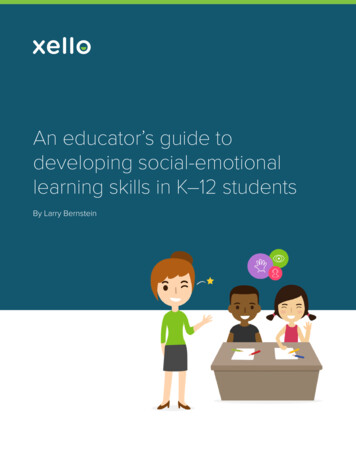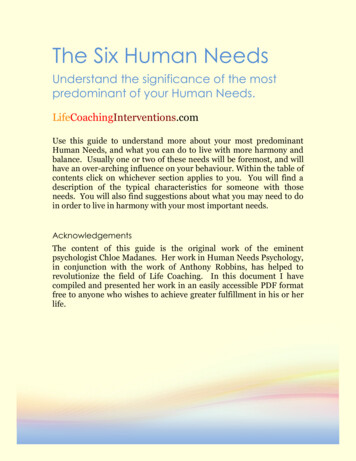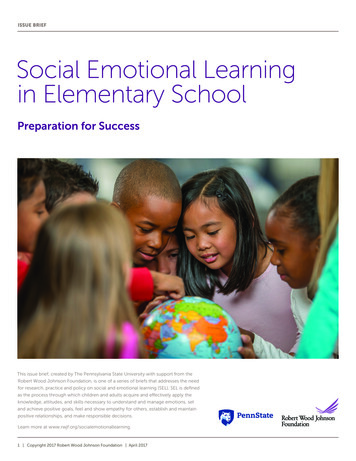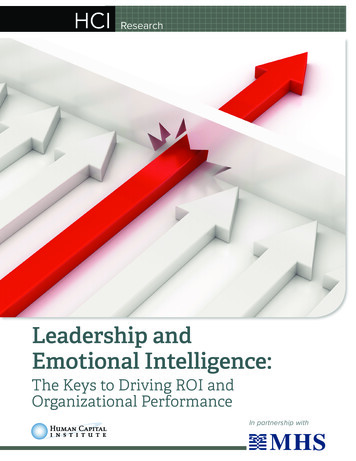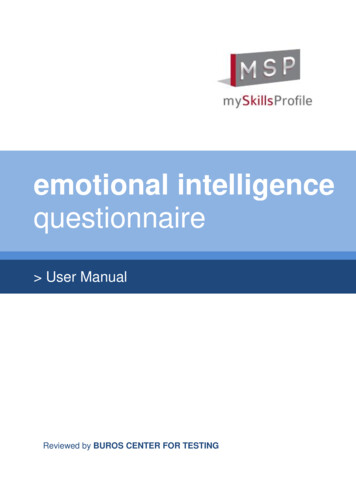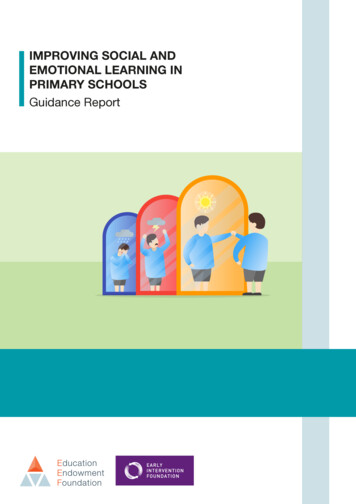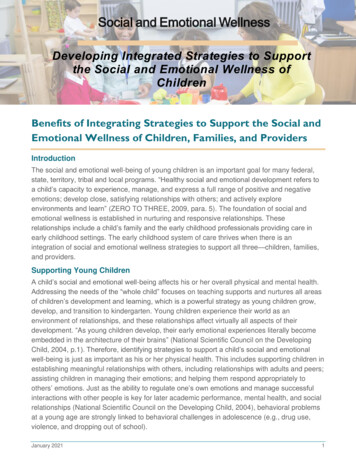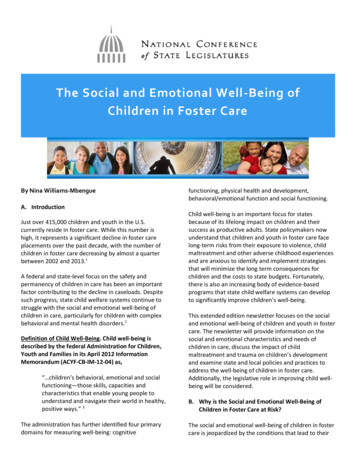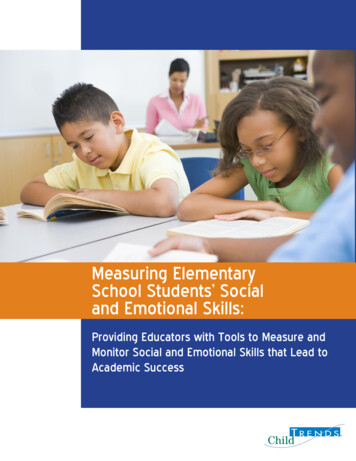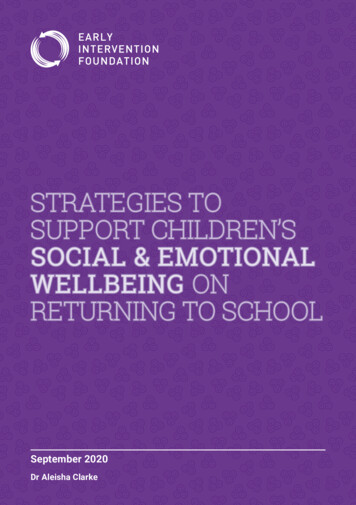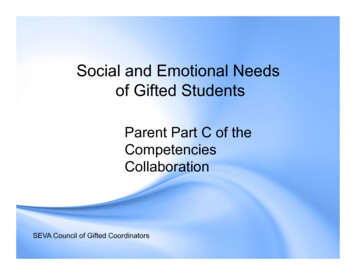
Transcription
Social and Emotional Needsof Gifted StudentsParent Part C of theCompetenciesCollaborationSEVA Council of Gifted Coordinators
Once a student is identified as gifted, determination of services isrequired. Questions about rigor and enrichment, cluster grouping in aclassroom, acceleration, and grades are major discussions amongparents and teachers. However, the affective needs of the giftedstudent are not as frequently considered.What are the social and emotional issues of the gifted student?How can these needs of the gifted student be addressed?Our kids are normal. They just aren'ttypical.Jim Delisle
Table of nchronyMul-- es
OverexcitabilitiesDabrowski’s Theory Kazimierz Dabrowski, Polish psychologist Identified five personality characteristics or intensities,which he called "overexcitabilities" or "supersensitivities,"which affect the way a student experiences the world Psychomotor oversensitivity Sensual oversensitivity Intellectual oversensitivity Imaginational oversensitivity Emotional oversensitivity
These students may have: Higher than average response to stimuli Reactions that are over and above average in intensity,duration and frequency Not all gifted students have overexcitabilities, but there maybe more people with overexcitabilities in the giftedpopulation than in the average population Children do not grow out of these supersensitivities. A childwith intense emotional feelings will experience the samedepth of emotion as an adult. Emotional overexcitability is most commonly seen in giftedstudents
Emotional Overexcitability The primary manifestation of this intensity is exceptionalemotional sensitivity. These students have great emotional depth and strongattachments to people, places, and things. There is a deepconcern for others, but they may also have intense self-criticismand anxiety. They may be accused of being melodramatic or overreacting,but these emotions are very real for them. Telling an emotionally intense student to ignore teasing ornot let the teasing bother him is impossible advice for thestudent to follow.
EmotionalOverexcitability They may have a strong sense of responsibility, but that mayalso create stress and anxiety or feelings of failure and guilt. These students may experience existential depression(depression over basic concerns about death, poverty,homelessness, war, diseases, etc.) These students may have intense empathy for others, includinganimals, and may choose to be vegetarians. They may have an acute sense of justice/injustice.“It’s not fair!”
Possible characteristics of students withemotional overexcitability Extremes of emotion Anxiety Feelings of guilt and sense ofresponsibility Feelings of inadequacy andinferiority Timidity and shyness Loneliness Concern for others, empathy Strong memory for feelings Heightened sense rightand wrong, of injustice andhypocrisy Problems adjusting tochange Depression Need for security Physical response toemotions (stomach achescaused by anxiety, forexample)
Parenting strategies for all overexcitabilities Help students develop strategies for recognizingstress reactions and coping with stress. Help students understand their own behaviorsand how their behaviors impact others. The emotions of these students are real. Yourmolehills really are their mountains.
ssness.hKp://www.merriam- Silverman,2000,p.58)
Behaviors of Perfectionism!! Depression" Nagging feelings of“I should”" Shame and guilt" Desire for face-saving" Procrastination" Self-deprecation" Poor risk analysis!
Reasons for the Association of Giftedness andPerfectionism" LoBygoalsrequiringconceptualthinking nologicalage Rela-onshipswitholderfriends Failure- ‐avoidanceasaconsequenceoflackofchallenge .learningorienta-on) Perfec-onis-cteachersandcompe--vepeers Introversion- ‐Schuler,2000
Attributes of Healthy Perfectionists(Seigle & Schuler, 2000)" An intense need for order and organization"" Self-acceptance of mistakes" High parental expectations" Use of positive coping strategies with their perfectionisttendencies" View of personal effort as an important part of theirperfectionism"
Attributes of Negative or Dysfunctional Perfectionists Anxiety about making errors (May stop trying to achieve out offear of making a mistake)" Extremely high or unrealistic standards for self (Self-esteemrises and falls depending on latest academic performance) " Perceived excessive expectations and criticisms from others(Distrusts positive comments)" Questioning their own judgments " Lack of effective coping strategies" Need for constant approval" Doesnʼt reward improvements" Inability to accurately judge risks or consequences" Desire to “save face” "
Gender and Perfectionism Perfectionism may look different in males in females dueto societal expectations ---how it “plays out” in their lives Girls – tend to over-commit, are expected to be wellbehaved and polite, agreeable and focus on relationships(“Hermione”) Boys – expected to be protective, risk-taking,competitive, be the hero (“Harry”)!
GamesPerfec-onistsPlay MoodRollerCoaster uality) ObsessingAbouttheFuture(what’snext?) PiningOverthePast(“ifonly .”)- ‐- ‐- ‐adaptedfromAdderholt&Goldberg,1999Bess B. Worley II, Ph.D.Gloucester County Public Schools
GamesPerfec-onistsPlay,cont. ) GoalsRunYourLife(ignorehealthandfriends) NothingButtheBest(constantdo- ‐overs) All- ‐or- ‐Nothing(haveto“haveitall”)- ‐- ‐- ‐adaptedfromAdderholt&Goldberg,1999Bess B. Worley II, Ph.D.Gloucester County Public Schools
Perfec-onis-cThinking MindReading(whathappenswhenyouassume ,rules)ExcessiveNeedforControl(correc-ngothers )- ‐AdaptedfromAnthony&Swinson,1998Bess B. Worley II, Ph.D.Gloucester County Public Schools
Coping with Perfectionism" Learn how to mentally filter thoughts, focusing on successesinstead of mistakes" Concentrate effort on the things that really need the extraattention" Reevaluate current standards by comparing to set criteria usedby others (Set realistic goals)" Celebrate successes" Develop the capacity for constructive failure; presentperformance sets the tone for future improvement (Learn frommistakes.)" Develop self-concepts separate from products" Look closely at current level of self-acceptance and surroundyourself with positive situations and positive people" Recognize that commitment to excellence is a lifelong struggle
What Parents and Teachers Can Do to HelpAdapted from work by Betty Meckstroth "!Convey courage “I know you can try it!” Transformation comes by trial.!!Reward experimenting Encourage students to try a skill out without being committed to highperformance. Sometimes, its worth is in the learning experience. Adeptstudents especially need to accept the value of practice, experimentation,and persistence. Risking an attempt is about motivating themselves andpersisting in the face of frustrations. "Expect progress, not perfection Finished may be better than perfect!"Applaud persistence Successful people keep on working at something even when their efforts arenot immediately rewarding. Learning to delay gratification is essential forpersonal success and satisfaction.
!Break the task down into small, attainable goals Sense of failure comes from inappropriate goal setting. Inch by inch, itʼs acinch. Yard by yard, itʼs hard. ""Acknowledge learning Expect progress, not perfection. How do you eat an elephant? One bite at atime. Ask, “What did you learn while you were doing this?” “What might youtry next time?” “How might you do it differently next time?” Ask, “Whatʼs goodabout it?”"Discover meaning “What were you thinking about while you decided which colors to use?”""Honor time invested “You gave a lot of your time to this. It must have been important to you.”!
Existential Depression and Giftedness Gifted students may experience existential depression or angst(depression over basic concerns about death, poverty,homelessness, war, diseases, meaninglessness, etc.). Young gifted students may be especially susceptible to thisdepression because of their perceived inability to alleviate theinjustices and problems of the world.
Helping a Student Who is Depressed(Webb,et.al.,2007)1. Notice how long the student has been depressed; do notdismiss depression as “a stage.”2. Listen: express extra support and concern that you wantto help make life more enjoyable.3. Accept the concerns. Try to see the depression and underlying anger from thestudent’s point of view Do not minimize the intensity of the student’s feelings: donot say, “You shouldn’t feel that way,” and avoid saying thathe/she has nothing to be worried or depressed about. Support the student: leave the door open to alternativeways the student sees himself or the situation
4. Give emotional support. Use books or movies that depict characters dealingappropriately with issues such as aloneness ordepression. (Be aware that some gifted studentswithdraw into books to avoid action.)5. Evaluate the level of depression and degree of risk.Signs of serious or severe depression: Sudden changes in sleeping or eating habits Inability to concentrate Talk of dying or preoccupation with death Giving away valued possessions Withdrawal from family or friends Recent loss of social supports Involvement with drugs or alcohol
6. Is suicide a possibility? If you have any idea or suspicion that the studentmight be considering self-harm or suicide,contact the school counselor immediately.7. Take action. Depression should not be ignored. Consult with aprofessional counselor or doctor.
Understanding AsynchronyWhat is asynchrony (or asynchronicity)? “Not synchronized” Gifted students are asynchronous in that their physical development(chronological age), intellectual development (intellectual abilities ormental age), and social/emotional development (social behaviors)do not develop equally at the same time. A seven year old giftedstudent in second grade may have an intellectual ability equivalentto a 10-year-old, and be able to read on a fifth grade level, but maybehave like a six year old at times. Just because a gifted student may have exceptional intellectualmaturity does not mean that he always displays emotionalmaturity!
Dealing with Asynchronous Development Recognize that a student’s emotional and social developmentwill not always match his or her emotional development. Beforeresponding to an emotional outburst or concluding that thestudent is immature, stop a moment and remind yourself of thestudent’s chronological age. Understand that asynchronous development creates specialneeds. Gifted students need emotional support, as do allstudents, but they also need advanced intellectual stimulation.A gifted first grader who can discuss black holes may still needa comforting hug. Recognize that gifted students may not get their emotional,social, and intellectual needs met by the same peers. They maybe able to socialize to a degree with students their own age, butwill also need opportunities to interact with other gifted students,older students, or even adults. Teachers should make everyeffort to provide those opportunities.Carol Bainbridge
Multi-potentiality In general, MULTIPOTENTIALITY refers to astudent’s ability to excel inmore than one area.
Multi-potentialityPROS: The student has his/herchoice of numerous,viable career paths; attimes, unrelated. The student might excelequally in both scienceand dance, math andmusic, and/or history andtheater.CONS: The student mightexperience great conflictwhen selecting a careerpath or in makingchoices.
Strategies for assisting students Make sure students have the opportunity to exploremany kinds of careers Help students start thinking early about what kindsof careers they might enjoy (elementary school isnot too young!), and then explore what the collegerequirements for those careers might be Make sure students keep their options open – takepre-requisite courses for multiple career paths, ifpossible
Gifted UnderachievementThere are at least three underlying themes in the definitionof gifted underachievement: Underachievement as a discrepancy between potential achievement and actual achievement.Underachievement as a discrepancy between predictedachievement and actual achievement.Underachievement as a failure to develop or use unda-ons/EDN%20553/Underachievement.pdf
Causes of Underachievement Low self-esteemPoor self-efficacyAvoidance behaviorsRebellionPerfectionismPoor functioning in competitionDavis, G. A., Rimm, S. B., & Siegle, D. (2011). Education of the gifted and talented. (6th ed.). Boston, MA: Pearson.
Gifted students can be underachievers for a variety of reasons,including: Wanting to hide their giftedness so as not to be different from their peersor social group Different priorities than the teacher (“neatness” is generally not a priorityfor gifted students) Frustration with lack of challenging material (“Why should I do this if Iknow it already?”) Perfectionism Deliberately failing is easier than admitting you don’t know something,because gifted students are supposed to know everything Not all gifted students get A’s. Not all straight-A students are gifted. Gifted students are not always gifted in everything.
Personality Characteristics of Underachievement Low self-esteem, self-concept, self-efficacy Alienated or withdrawn; distrustful, or pessimistic Anxious, impulsive, inattentive, hyperactive, or distractible, mayexhibit ADD or ADHD symptoms Aggressive, hostile, resentful, or touchy Depressed Passive-aggressive More socially than academically oriented Dependent, less resilient than high achievers Socially immature
Underachievement Reversal Strategies Fill educational gapsProvide interest-based projectsProvide independent studiesInvolve parentsOffer extracurricular activitiesReview IEPs if appropriateProvide mentorsProvide group and individual counselingProvide bibliotherapyCrunch assignments and slowly expandTeach students self-regulation skillsDavis, G. A., Rimm, S. B., & Siegle, D. (2011). Education of the gifted and talented. (6th ed.). Boston, MA: PearsonPagnani, A. R. (n.d.). Gifted underachievement: Root causes and reversal strategies. University of Georgia. Retrieved from fultongifted.org
Self-Regulation Example:Time Management Set regular study periodsSet realistic goalsUse a regular study areaPrioritize tasksLearn to say no to distractionsSelf-reward success
Perfectionism’s Cousin: Procrastination Procrastination is related somewhat to fear of failure butalso to motivation/interest One research study and review of research suggestshigh levels of procrastination are related to low intrinsicmotivation/high extrinsic motivation Increasing interest in activity or course material maydecrease procrastination- Senécal, Koestner, & Vallerand, 1995Bess B. Worley II, Ph.D.Gloucester County Public Schools
Tips for Procrastinators Allow more time than you think is neededSet flexible but realistic goalsBreak big projects into smaller onesStart something now, even if you don’t feel preparedRealize that nothing can be perfect--- adapted from Adderholt & Goldberg, 1999Bess B. Worley II, Ph.D.Gloucester County Public Schools
Tips for Procrastinators, cont. Begin with the most difficult or least enjoyable task Have fun without the guilt Keep a diary of your progress---list accomplishmentsand feel proud Remove distractions from work area Keep a list of projects you want to do if you use yourtime productively--- adapted from Adderholt & Goldberg, 1999These tips might alsowork for parents whoprocrastinate!Bess B. Worley II, Ph.D.Gloucester County Public Schools
Tips for the Parents of Students Who Procrastinate Encourage them begin projects and large assignmentsearly Help them break large assignments into smaller pieces(i.e., outline, reference list, introduction, etc.) Praise the process----help them focus on effort andtime spent on the processBess B. Worley II, Ph.D.Gloucester County Public Schools
Tips for the Parents of Students Who Procrastinate, cont. Help them alternate between tasks they enjoy andtasks they dislike Encourage them to keep a journal of the thingsthat make them proud of themselves; help them bespecific Structure homework to limit distractions Encourage beating deadlines by providingextrinsic and intrinsic incentivesBess B. Worley II, Ph.D.Gloucester County Public Schools
Twice Exceptional StudentsIdentification of giftedness in students who are disabled isproblematic. Standardized tests may be incomplete sources ofinformation for these students and observational checklists may beinadequate for uncovering hidden potential in children who havedisabilities. In addition, gifted children with disabilities often use theirintelligence to compensate for the disability. This may cause bothexceptionalities to become less obvious. The disability may appearless severe because the child is using her intellectual skills to cope,and that effort may hinder other expressions of giftedness. Researchalso shows that it may be difficult to distinguish between somebehaviors that are characteristic of students with ADHD and otherbehaviors that may be characteristic of some gifted students.
Suggestions on Serving Twice Exceptional Students If you suspect that a special needs student might also be gifted,make the referral! The Special Education teacher and the gifted teacher should workcollaboratively to meet the needs of the student. A gifted teacher or specialist should be on the IEP committee.Accommodations on the IEP should be followed in the giftedclassroom. Be organized and teach organizational skills to maximize studentsuccess. Ask for specific professional development if needed, such as forworking with autistic gifted students or dyslexic gifted students. Compact and differentiate instruction to meet the intellectualneeds of the student.
Issues with Self-Esteem and Self-ImageSome gifted students may have a poor self-image or low self-esteemdue to: Having an understanding of how little they do know compared to the world’sbody of knowledge – they know how much they don’t know Frustration that they cannot solve the world’s inequities and problems(supersensitivity to injustice) Feeling out of place socially, intellectually “Things were easy before; now they are difficult, so I must not be as smartas they said.” Fear of loss of image if they reveal fear or self-doubt Lack of validation from teachers (“If you are so smart, why can’t you figure itout by yourself?” “You couldn’t have done this by yourself; someone musthave helped you.)”This can be extremelydevastating to students!
Issues with Self-Image, cont. Overly high expectations can be paralyzing (“There is no way I can getinto Harvard, so I won’t even try”; “I would rather fail on purpose thantry and then fail”) Having to hide intelligence- So as to not appear conceited or arrogant So as not to be teased: “teacher’s pet” or “know-it-all” or “smartypants” or “nerd” or “geek” So as to fit in – you can’t use advanced vocabulary with peers whodo not understand it Cognitive dissonance – seeing but being unable to do anything aboutthe “way things are” vs. the “way things ought to be” Athletic honors are seen as more important/getting more recognitionthan academic honors; academic honors are less (and sometimes notat all) valuedIntelligence is part of whoyou are you should nothave to hide your identity!
Gifted Boys Sometimes Are pressured to demonstrate athleticism with peers. They learn thatathletic ability makes intelligence acceptable. Act out when bored; bully others Learn best through movement, action, and tactile activity Hide creativity and sensitivity to fit in Interrupt and demand more attention from others Blame teacher or subject for bad grades Become less involved in leadership opportunitiesas they progress through school Pursue careers in math and science areas And sometimes, not so much. The point to remember is that it is notalways easy to be gifted, and students may deliberately try to hidetheir giftedness, especially if they are being teased about it.RetrievedfromhKp://giBedkids.about.com
Gifted Girls Gifted girls are faced with numerous, complex choices that affect thecourse of their lives. Issues seem to be particularly problematic inthe middle school years. Cultural stereotypingGender rolesConflicting messagesLack of role modelsDeclining confidence in abilitiesConflicting expectations from teachers and parentsPeer pressure to hide abilities and intelligence
Suggestions for Meeting the Needsof Gifted Girls(Kerr, 1994; Silverman, 1993) Communicate with parents: The abilities of their daughter Importance of math and science for higher education andcareers Encourage them to identify and address the sources of genderbias Organize peer support groups for girls Math and science clubs Connect them with other girls who share their same interests Avoid praising girls for their neatness or behavior Point out examples of their excellent work and achievements Correct them if they attribute their accomplishments to luck
Suggestions for Meeting the Needsof Gifted Girls, cont. Provide and encourage opportunities to use leadershipabilities Provide role models and mentors from nontraditional careers Discuss gender stereotypes and the mixed messages thatsociety broadcasts about femininity, intelligence, andachievement Provide a safe environment for girls to share confusion andfear Recruit girls to participate in advanced courses andextracurricular activities related to math, science, andtechnology Provide research opportunities on female contributions to
Suggestions for Meeting the Needsof Gifted Girls, cont. Provide counseling that includes career options and balance Support early gifted identification and programming Provide opportunities for independence and risk-taking Read biographies of eminent women From kindergarten to grade 12, use spatial reasoningstrategies to build skills needed for math and engineering
Teasing/Bullying and the Gifted StudentTeasing is actually another form of criticizing and harassment.Although bullying is not the same as teasing, both could includedirect, verbal criticisms. The student who teases is usually puttingothers down. Although bullying and teasing are similar, bullying ison-going and sustained, and intended maliciously.Gifted students are too often the targets of teasing and bullying. Attimes it may be less obvious name-calling, intimidation, or socialisolation. Failure to recognize this problem can sometimes cause thevictim to become emotionally and/or socially devastated. Somegifted students who are teased may be left with feelings of anxiety,depression, withdrawal, and sometimes violence.
Teasing/Bullying Adults must closely monitor areas or situations to prevent opportunitiesfor teasing.Help gifted students to know each other and their peers.Be a confidant and take reports of teasing/bullying seriously.Encourage gifted students to report acts of social aggression againstthem.Take a stand – Support from teachers and parents is important.Video: VerbalBullyingandTeasing- video id 217672Which intervention steps were used? How can the teasing be prevented in the future? Who should bepunished? How?
Teasing/Bullying intervention strategiesRetrieved from teaser.htmDealing with The Chronic Teaser. November, 2012. School-wide intervention strategies are the most successful witheradicating the problems of teasing/bullying.The teaser needs to be taught about differences among students.Find out why the teaser teases and educate the student about theharmful consequences.Teach what to do in the event that you witness teasing.Teach the skills for dealing with the teaser.Teach that teasing will not be accepted and will not be tolerated in theclassroom.Teach the student that is getting teased to provide the teaser with aresponse they're not expecting. [not violence]Students need to be part of the solution and or consequences.Reinforce that it's not the student but what he/she did that upsets you.
Help students understand how to respond to different kinds of bullyingbehaviors: Aggressive bullies are likely to abuse physically and without hesitation,may steal or break things. Report to an adult immediately. Taunting bullies are verbally abusive (calling names, making jokes,teasing, etc.). Walk away; don’t react; report to an adult. Indirect bullies spread rumors, exclude others, and harass their victimswhenever possible. Stand up to them; avoid their “friendship.” Cyber-bullies harass other kids through instant messaging, e-mail, andany other electronic means. Forward the message to an adult; blockthem; don’t post any personal information or photos. Help students understand that reporting bullying behavior is not“tattling” but is preventing potentially serious trauma. When bullying occurs, sitting by silently and not reporting it makes someoneas guilty as the bully.
Understanding Cultural IssuesGifted students who are culturally and linguistically diverse (CLD)may express some social and gifted behaviors differently than ourcultural norms. Often CLD students follow hidden rules unknown toclassroom teachers. Hidden rules are unspoken cues and habits of agroup (Slocumb & Payne, 2000). While there are differences amongindividuals, there are often similarities within cultural groups. Thefollowing two slides provide examples.
Typical U.S. SchoolCulture The focus is usually on theindividual. Independence is usuallyvalued at school. Analytical endeavors areusually emphasized. School personnel expectparents to be partners withteachers in the education ofchildren.as cited in Tomlinson, 2003Some Diverse Cultures The emphasis is often on the group. Cooperative problem-solving maybe the norm Strengths in creative endeavorsare often emphasized. Teachers may be viewed as havingthe sole responsibility for academiceducation.
Ways that teachers can become more culturally aware,sensitive, and competent1. Analyze personal attitudes and perceptions of culturally andlinguistically diverse students2. Acquire accurate cultural information about these students (e.g.customs, traditions, and values)3. Acquire ongoing staff development to understand their social,emotional, and academic needs4. Infuse multicultural teaching strategies, materials, and resourcesinto all subject areas and topics as often as possible5. Avoid stereotypes (of course)6. Have high expectations for all students, including them inadvanced groups and differentiating instruction for them as neededBanks & Banks, 2006, (as cited in Ford, Grantham, & Whiting, 2008)
Please help find these underserved students!Make a referral if There are many cultural differences in the way gifted students show evidenceof their talents. We are looking for evidence of critical thinking, abstractreasoning, and intellectual creativity.Does this student ask thoughtful questions?Does this student give creative, insightful, or unusual responses?Does this student provide interesting details or seem unusually observant?Is this student good at seeing relationships, connections, and “the bigpicture”? Does this student have a large vocabulary or seem to know a lot ofinformation? Is this student ESL, but is learning English (and the nuances of thelanguage) very quickly? Does this student rarely do homework or turn in assignments, but stillseems to understand the material?
Additional Resources on Depression and the Gifted Child Gust-Brey, Karyn and Tracy Cross, (September 1999). An Examination of the Literature Baseon the Suicidal Behaviors of Gifted Students. Roeper Review, 22, (1), 28-35.Harkavy J. and G. Asnis, (1985). New England Journal of Medicine, 313, 1290-1291.News Briefs (May/June 1999). Symptoms of Depression. Gifted Child Today, 22 (3), 7. Ramirez, Monica (May/June 1999). The Perfect Trap. Psychology Today, 32 (3) 30-34. Seigle, Del and Patricia A. Schuler (September 2000). Perfectionism Differences in GiftedMiddle School Students. Roeper Review, 23 (1), 39-45. Silverman, Linda (1999). Perfectionism. Gifted Education International, 13 (3), 216-225. Tucker, Brooke and Norma Lu Hafenstein (1997). Psychological Intensities in Young GiftedChildren. Gifted Child Quarterly, 41 (3), 66-75.
Teasing/BullyingResourcesBullying: Taking charge. ASCD PD-Online Workshop. (2011). Course # CIQ017-08-12U. Offered by ChesapeakePublic School.Consumer Affairs. ( 2006). Study: Gifted students become bully magnets. Google custom 04/bullies.html .Davis, S. (2005). Schools where everyone belongs: Practical
Emotional Overexcitability The primary manifestation of this intensity is exceptional emotional sensitivity. These students have great emotional depth and strong attachments to people, plac
